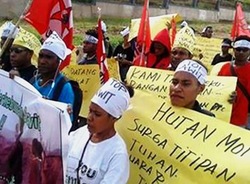Asia Pacific Report | 25 May 2016
West Papuans, activists protest against Sorong oil palm expansion
West Papuans, activists protest against Sorong oil palm expansion
As the indigenous people of Sorong, Nabire, Merauke and elsewhere in West Papua continue to resist oil palm expansion, there now appears to be some hope that the government is responding to President Joko Widodo’s call last month for a moratorium on all new permits. Professor San Afri Awang, Director-General of Forestry Planology and Environmental Governance, has said: “We have rejected and terminated the licensing process for all new palm oil plantations submitted by 61 companies for an area of more than 851,000ha.”
Hundreds of indigenous people and activists from a range of backgrounds have demonstrated at the Sorong Regency District Legislative Council in West Papua to demand a stop to the expansion of oil palm which has already destroyed thousands of hectares of forest in the area.
This action is also to show their support for the central government which last month started talking about a moratorium on new land for oil palm in Indonesia.
“All work on oil palm plantations across Sorong Regency must be stopped, because thousands of hectares of the people’s forest has already been destroyed”, participants shouted out during speeches outside the council building.
The indigenous people and activists which have joined the movement to oppose land clearing for oil palm are comprised of young Moi intellectuals, the Malamoi Indigenous People’s Association and Moi people who care for the Malamoi forest, youth and student movements (GMNI, GAMKI, GMKI, the Association of Moi students in Sorong Muhammadiyah University (Himamus) and the Moi Students’ Association in Indonesia (Himamsi)).
The action started on foot from the public ground in Aimas, the Sorong Regency capital.
The chair of the Sorong Branch of the Indonesian National Student Movement, Manu Mobalan stated that they were also opposing new land for oil palm as a protest against the behaviour of existing oil palm plantations in Sorong, which have destroyed the forest in the area.
“The oppression of ordinary people is increasing, which means we need a opposition movement to save the Malamoi forest. Investors do not look after the interest of oppressed people”, said Mobalan.
Right to self-determination
Wilson Mobalen, a demonstrator, stressed that all people should have the right to self-determination in their home country, which means they can do without oil palm.
“Our fate is not determined by oil palm but by God. Forest and Nature have taught and raised us. Oil palm is not the right recipe for Papuan people, especially the Moi people. God is the one who decides our fate,” he said.
The demonstration took place under the surveillance of hundreds of officers from the Sorong Regency police station. Once they had communicated their demands, the crowds dispersed in an orderly way.
Meanwhile, Greenpeace forest campaigner Richard Charles Tawaru said that essentially the indigenous people’s demonstration had underlined that the community did not want any more oil palm expansion in Sorong Regency.
“The people have had bad experiences with oil palm, which has brought no benefits, but has caused the forest to disappear along with animals for hunting, and water sources are reduced,” Tawaru said when called from Manokwari last night.
The demonstrators used the example of two oil palm companies that are already operating in the area, PT Henrison Inti Persada, which started its plantation in Klamono in 2006 and PT Inti Kebun Sejahtera, which has been in the Salawati area since 2008.
Opposition plans
The demo was also to show community opposition to plans to clear another 24000 hectares of land for oil palm in the area, which had already been granted an in-principle permit by the government.
The planned expansion would take place in Klaili, Klasow and Moraid sub-districts, by two companies from the same group: PT Mega Mustika Plantation has permits for over 9300 hectares and PT Cipta Papua Plantation has permits for over 15000 hectares.
According to Tawaru, these permits originated in the Sorong Regency Forest Management Unit (KPH) scheme which was suggested by the Sorong local government and agreed to by the forestry ministry.
Tawaru said that even the forestry ministry had granted permits for this vast new oil palm project.
Translation from Bahasa in Cahaya Papua to English by awasMIFEE published today.














